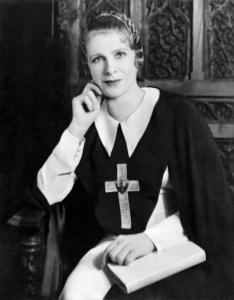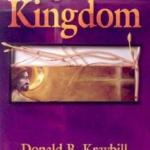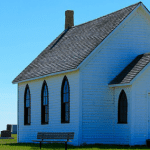The Almost Forgotten Story of Non-Liberal Feminist Christian Women Influencers
By “non-liberal” here I mean theologically conservative, even if sometimes unorthodox in some beliefs.
Many books about the forgotten history of women influencers in Christianity focus on mystics and later, modern feminist theologians. I have sometimes made a point of emailing or directly asking, face-to-face, knowledgeable Christian feminist historians and theologians about certain conservative women Christian influencers. In most cases my questions have been brushed aside. I remember reading a book about the history of women in Christian theology. The name Rachel Hadley King was notably missing. I emailed the editor of the volume and asked why the book contained no mention of King or Phoebe Palmer or certain other very influential women Christian influencers and leaders. The response I received was, well, to say the least, unsatisfactory. King, for example, was brushed off as unimportant.
Here I want to just mention a few of the most influential conservative Christian women, mostly in American church history, and ADD a few influential women religious leaders who conservative Christians would not want to embrace as part of our history.
My sole point is this: The history of extremely influential women in American religious history has been largely forgotten or at least neglected by modern/contemporary feminist historians and theologians—because they did not fit the profile those historians and theologians want to be in people’s minds about modern/contemporary feminist religious leaders and influencers.
Of course, needless to say, male historians and theologians have also neglected these women religious leaders, as marginal “outliers” in Christian and religious history in America.
The 19th century saw the rise of many women religious influencers in America. Many of them left traditional Christian denominations and founded or co-founded their own, separate sects and denominations, movements and fellowships. This movement of conservative (whether orthodox or heterodox) women religious leaders lasted well into the 20th century.
Perhaps the best known of all these women religious leaders in America (who were non-liberal in their theology) is “Sister Aimee,” Aimee Semple McPherson, whose picture is featured here. She was a force of nature, a celebrity, a controversial figure even in the secular media, throughout much of the first half of the 20th century (beginning in the 1920s). Everyone in America knew who she was. She was Pentecostal, a healing evangelist, a powerful preacher of the gospel, founder of her own denomination, the International Church of the Foursquare Gospel, pastor of her own mega-church (Angelus Temple in Los Angeles), owner of her own radio station, etc., etc. I grew up in a small Pentecostal denomination founded by former associate evangelists who Sister Aimee.
But there are many almost equally influential non-liberal Christian (and not-so-Christian) religious women in American history. Think, for example of Mary Baker Eddy, founder of the Church of Christ, Scientist, and Ellen G. White, prophet of the Seventh Day Adventist Church whose writings are still revered by members.
Jumping to the other end of the spectrum in terms of fame, the 19th century saw a number of women who founded intentional Christian communities such as the Womans Commonwealth, begun in Belton, Texas then moved to a farming commune in Maryland. The founder and leader was Martha McWhirter and it was a church as well as a place for women to have fellowship and work. No men allowed! The Commonwealth no longer exists, but is a very little known and very interesting religious group in American history.
Another woman Christian leader was Phoebe Palmer who, in the mid-nineteenth century, led religious meetings in New York and elsewhere that became the foundation (or one of them) of the Holiness movement that eventually spawned many denominations. She was a Methodist who believed in and taught “Christian perfection” a la John Wesley in “A Plain Account of Christian Perfection”—that it is possible for a Christian to live a life without sin.
Yet another woman Christian leader was Alma White, founder of a denomination called Pillar of Fire with institutions in New Jersey and Colorado that still exist. The denomination has dwindled much and has repudiated White’s racism, but in her time, White was a major religious figure in American conservative Christian circles.
Yet another woman Christian leader was Florence Crawford who founded her own Pentecostal denomination that exists to this day—The Apostolic Faith Mission (one of several called by that name). She founded it and a Bible college in Portland Oregon. Some of the founders of the Pentecostal denomination in which I was raised were her associate evangelists.
I cannot overlook perhaps the most influential of all conservative Christian woman influencers in the mid-20th century: Henrietta Mears who led a massive Bible study, attended by hundreds, if not thousands, at Hollywood Presbyterian Church in California for decades. Many historians believe her and Billy Graham’s ministries were intertwined in some way. There can be no doubt that some of Graham’s associates funneled converts into her Bible class at the church. Mears wrote many books including “What the Bible Is All About” that sold millions of copies in many languages.
Finally, and I could go on with this, there was Kathryn Kuhlman, healing evangelist par excellance, whose mass crusades drew many thousands in the 1960s through the 1980s. She also wrote books that sold very well, appeared on “Christian television” (talk programs), and was a sought-after speaker and preacher, especially by Pentecostal and charismatic churches and organizations. I was privileged to attend one of her mass healing crusades in the 1970s and it was, simply put, astonishing. I saw, fairly close up, people I knew planned to resist her touch (that led most people to fall or be “slain in the Spirit”) who fell hard when she barely touched them on the forehead. I asked one of them afterwards, who fell twice!, what happened and he said simply “I don’t know” and didn’t want to talk about it.
Finally, I must mention the much neglected theologian Rachel Hadley King, a Quaker/Friends teacher of theology at a New England Christian college. Her most noted work was “The Omission of the Holy Spirit in the Theology of Reinhold Niebuhr” but she wrote several books of Christian theology that were published and sold well.
Today, of course, and in recent decades there are and have been many conservative Christian women influencers. But I have met many people who thought this was a purely new phenomenon and who know nothing of the history I set forth briefly above.
I could mention, of course, non-Christian women religious influencers and leaders, especially in the New Thought Movement and the New Age Movement, both of which were and are open to women’s leadership. But I consider those movements spiritual but not Christian. I only mentioned Mary Baker Eddy above because of her tremendous influence and her often believed claim to be a Christian. I mentioned Ellen G. White because I believe she was a Christian, however mistaken about some subjects including her own gift of prophetic insight and word.
This is, as one YouTuber says, “history that deserves to be remembered,” but often isn’t. The modern/contemporary Christian and other feminist movements are often embarrassed by these former women religious leaders and don’t want to claim them as their forerunners. Most I have met and talked to, have never even heard of Martha McWhirter and her all-female church.
*Note: If you choose to comment, make sure your comment is relatively brief (no more than 100 words), on topic, addressed to me, civil and respectful (not hostile or argumentative), and devoid of pictures or links.*














